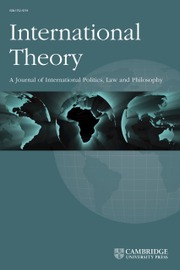-
- You have access: full
- Open access
- ISSN: 1752-9719 (Print), 1752-9727 (Online)
- Editors: Claudia Aradau King’s College London, UK, Catherine Lu McGill University, Canada, and David Welch University of Waterloo, Canada
- Editorial board
While International Theory welcomes scholarship that uses empirics to advance theoretical arguments, articles whose primary focus is empirical do not fall within the journal’s remit. Nor do articles that concern only a specific country or region; that are better suited to comparative politics journals; or whose primary goal is policy advocacy or foreign policy analysis.
International Theory aims to promote communication and engagement across theoretical and disciplinary traditions. Accordingly, it puts a premium on contributors’ ability to reach as broad an audience as possible, both in the questions they engage and in their accessibility to scholars with diverse theoretical commitments or methodological approaches. While the journal is open to work that is situated within one scholarly tradition, it encourages authors to reflect on how their research relates to other work in the field more broadly.




Twitter